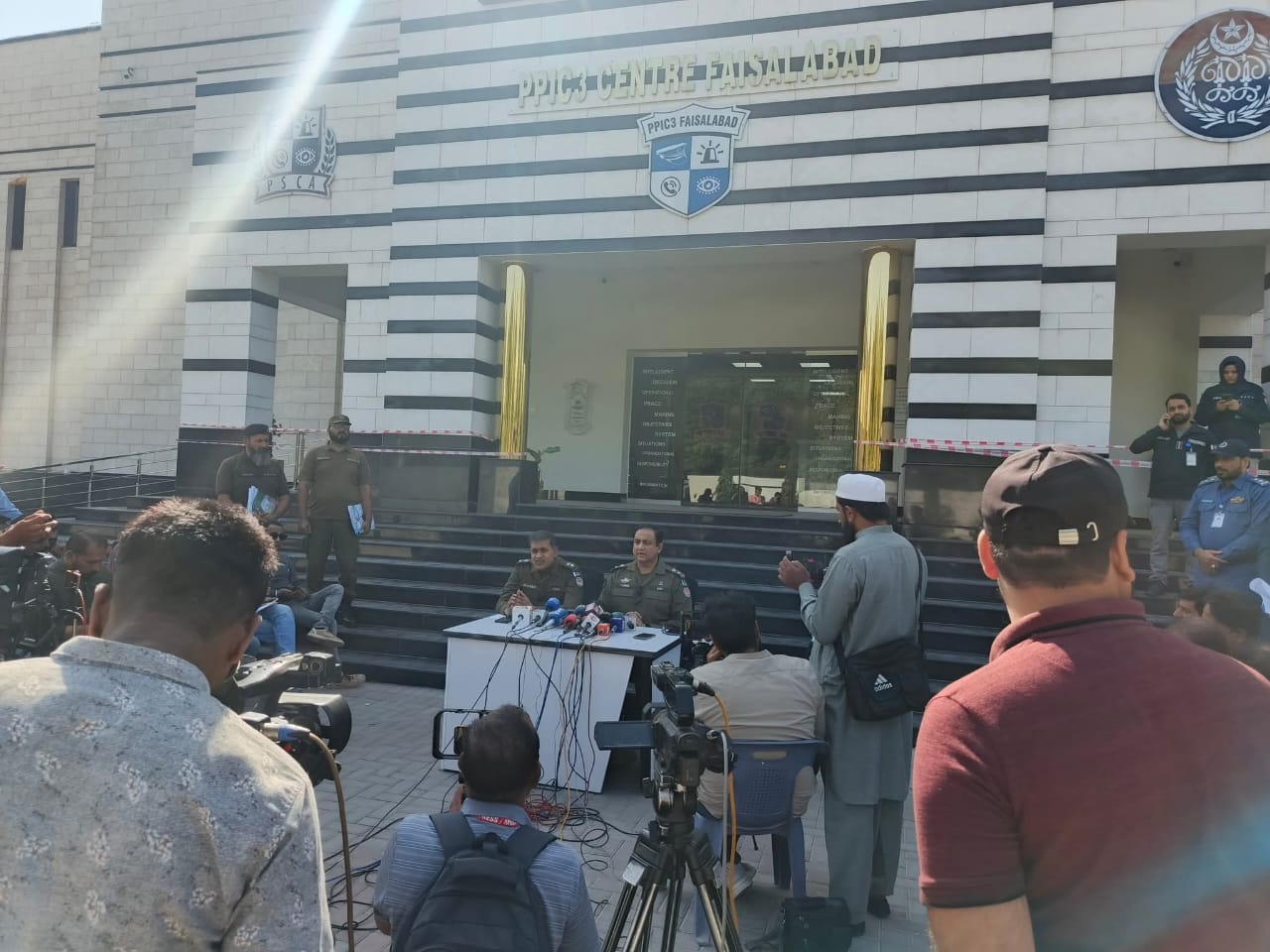(Writer: Mian Iftikhar Ahmad, Editor: Kainat Rajput)
The official launch of the E-Challan system in Faisalabad marks a significant and timely step toward modernizing the city’s traffic management. As Pakistan’s major industrial hub, Faisalabad has faced growing challenges due to the increasing number of vehicles, rising congestion, and frequent traffic violations, which have all contributed to a noticeable decline in discipline on the roads. In this context, the introduction of the E-Challan system by Safe City Faisalabad is not only a move to strengthen the rule of law but also a step toward integrating technology with civic responsibility. It encourages citizens to understand and follow traffic regulations through an automated, transparent process.
To introduce this initiative, Safe City Faisalabad organized a media briefing attended by representatives from various prominent media organizations. During the briefing, SSP Safe City Faisalabad Malik Tariq Mehmood and CTO Faisalabad Rana Nasir Javed provided detailed insights into the system’s mechanism, benefits, and key guidelines for citizens. Both officials expressed confidence that this digital system would usher in a new era of traffic management in Faisalabad. Through advanced CCTV cameras and digital monitoring tools, traffic violations will now be automatically detected, and challans (fines) will be issued directly to vehicle owners.

The officials further explained that the E-Challan system ensures transparency and convenience for citizens. It minimizes direct interaction between motorists and traffic officers, reducing instances of corruption, undue influence, and on-road disputes. Citizens can check their challan details on the official Safe City Faisalabad online portal and make payments through authorized channels. SSP Malik Tariq Mehmood emphasized that adherence to traffic rules is a civic duty, and the law will apply equally to all. Faisalabad Police, he said, “aims to establish a safe and organized traffic system through public cooperation”. He also made it clear that violators, regardless of their social status, would face legal action without exception.
CTO Faisalabad Rana Nasir Javed stated that the implementation of E-Challan will bring visible improvement to road discipline, reduce the frequency of accidents, and encourage a culture of law-abiding behaviour among citizens. He added that by using modern technology, traffic management can be made not only efficient but also sustainable in the long run.
Safe City officials urged the public to embrace this system for their own convenience and safety, to obey the laws, and to play their part as responsible citizens. They noted that if the people of Faisalabad follow traffic regulations seriously, the city could soon become a model of efficient traffic management for the entire province. However, while celebrating the promising launch of the E-Challan system, it is equally important to reflect on Faisalabad’s previous comprehensive efforts for traffic reforms. Earlier, CPO Faisalabad Kamran Adil had taken a noteworthy initiative by establishing the “Road Safety, Traffic Management and Engineering Committee.” The purpose of this committee was to identify long-term and technically sound solutions for the city’s traffic challenges.

The committee was unique in its composition, bringing together high-level representatives from various sectors. Members included the CPO himself, then CTO Farhan Aslam, the Vice Chancellor of Government College University Faisalabad, the Director General of FDA, the District Emergency Officer of Rescue 1122, the SSP Highways, the Principal of DPS, the President of the District Bar Association, a hospital Medical Superintendent, a retired judge, a former military officer, representatives from the transport sector, and a journalist-activist who served as the committee’s convener. The committee’s complete record is still available at the CTO office, where Mr. Mohsin was appointed as the coordinator between the committee and the traffic police.
The committee’s first formal meeting was held at Government College University Faisalabad, where members discussed the city’s traffic problems in detail and presented their recommendations. Based on these inputs, the committee identified 23 key action points, out of which eight were prioritized for immediate implementation with written recommendations. One of the most notable outcomes of these recommendations was action taken after two consecutive fatal accidents at the Jhumra Flyover. Following the committee’s advice, the FDA was requested to install rubber speed breakers, safety railings on both sides, and clear speed limit signboards. All these measures were completed under the committee’s supervision, proving that effective implementation of well-considered recommendations can bring real and immediate improvement to the traffic system.
Unfortunately, enthusiasm for the remaining points gradually faded. Most recommendations remained confined to paperwork, and little progress was seen on the ground. The committee repeatedly informed the CTP in writing that its recommendations were not being acted upon and that citizens continued to face the same persistent challenges. Now that the E-Challan system has officially been launched in Faisalabad, it would be most appropriate to reactivate the “Road Safety, Traffic Management and Engineering Committee.” The members of this committee were not only experienced professionals but also individuals capable of providing integrated and practical solutions for traffic, engineering, urban facilities, and legal improvements.
Had these recommendations been consistently implemented, Faisalabad’s traffic scenario would have been much different today. Accident rates would likely have dropped, and road travel would have become safer, smoother, and more convenient for citizens. Given Faisalabad’s status as one of Pakistan’s major industrial and educational centres, improving its traffic system is not just an administrative necessity but an essential requirement for economic growth. Therefore, it is crucial that the SSP Safe City, CTO Office, and CPO Faisalabad jointly devise a strategy to reactivate this committee and integrate its recommendations with the current E-Challan system. This combined approach would not only enhance traffic discipline but also build stronger trust between citizens and public institutions.
If Faisalabad continues to balance law enforcement with improved urban facilities and careful traffic planning, it can become a model city for the entire Punjab. The E-Challan launch is indeed a beginning, but true progress will depend on simultaneous improvements in road infrastructure, signal management, parking facilities, pedestrian pathways, and public awareness campaigns. Only through such a holistic approach can Faisalabad truly become a safe, organized, and citizen-friendly city.
Note: (This article is presented as a set of recommendations and consultative observations for the officers of Safe City Faisalabad, the CTO Office, and the CPO Faisalabad, in the interest of sustainable traffic improvement in the city.)

